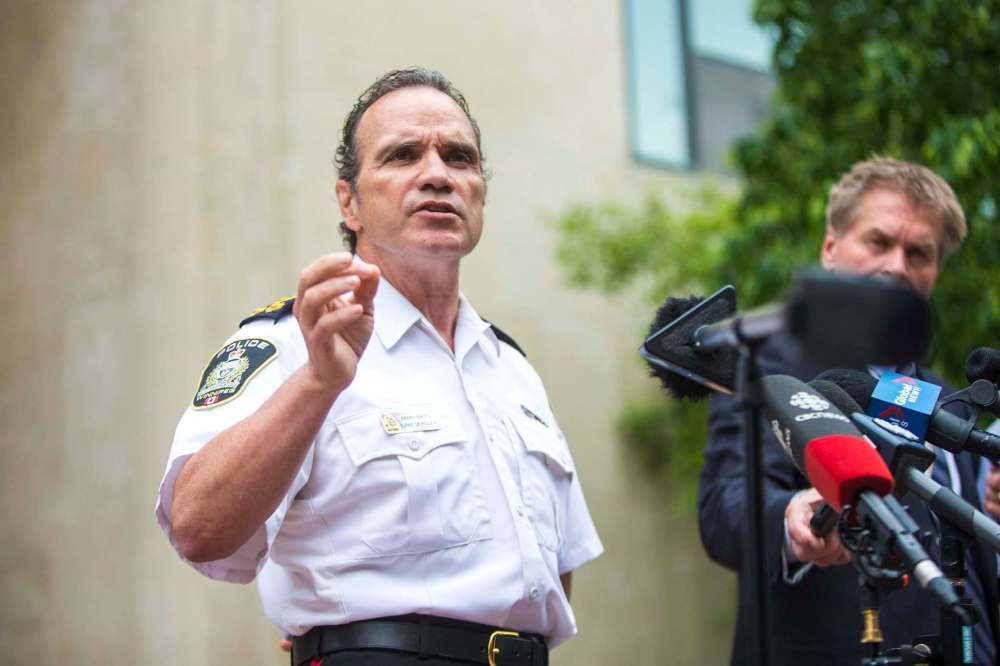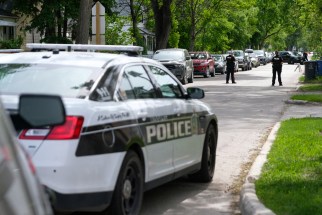Calls to ‘defund’ raise complex questions
Read this article for free:
or
Already have an account? Log in here »
To continue reading, please subscribe:
Monthly Digital Subscription
$0 for the first 4 weeks*
- Enjoy unlimited reading on winnipegfreepress.com
- Read the E-Edition, our digital replica newspaper
- Access News Break, our award-winning app
- Play interactive puzzles
*No charge for 4 weeks then price increases to the regular rate of $19.00 plus GST every four weeks. Offer available to new and qualified returning subscribers only. Cancel any time.
Monthly Digital Subscription
$4.75/week*
- Enjoy unlimited reading on winnipegfreepress.com
- Read the E-Edition, our digital replica newspaper
- Access News Break, our award-winning app
- Play interactive puzzles
*Billed as $19 plus GST every four weeks. Cancel any time.
To continue reading, please subscribe:
Add Free Press access to your Brandon Sun subscription for only an additional
$1 for the first 4 weeks*
*Your next subscription payment will increase by $1.00 and you will be charged $16.99 plus GST for four weeks. After four weeks, your payment will increase to $23.99 plus GST every four weeks.
Read unlimited articles for free today:
or
Already have an account? Log in here »
Hey there, time traveller!
This article was published 09/06/2020 (2014 days ago), so information in it may no longer be current.
Often repeated, but mostly misunderstood — that’s an apt description of one of the rallying cries heard around the world during recent protests in response to the unprovoked killing by Minneapolis police of African-American George Floyd:
“Defund the police.”
On its surface, it presents as a simple and repeatable distillation of the anger felt by many after this latest manifestation of deeply entrenched racial discrimination by law-enforcement agencies against people of colour: the police have consistently showed themselves to be bad, so strip them of their resources. Defund them. Dismantle them. Abolish them, even.
But as a practical matter, defunding and dismantling police departments as they currently exist is a rather complex question involving multiple layers of government and facets of public service that extend far beyond the realms of upholding the law and preserving peace and order. And while it’s a handy mantra, “defund(ing) the police” is an undertaking that would require levels of political will and budgetary commitment that have seldom been shown in this or any other jurisdiction.
When faced this week with questions about defunding the police, Winnipeg Police Service Chief Danny Smyth suggested an abrupt curtailment of police funding would create chaos for law enforcement and potential danger for Winnipeggers.
“If you were to just rip (out) a large segment of the (police) budget all at once, then I think you would be putting our environment into a more volatile place than it is now,” he said. “We have social workers on our staff; they won’t attend (incidents) unless we’re with them. Many of our own paramedics won’t attend calls unless we’re with them to ensure their safety…. It’s a little bit too early to just say ‘defund the police’ and funnel it all back to social services.”
It’s true that the immediate needs associated with policing make defunding a city’s primary law-enforcement agency a daunting prospect; it’s also true, however, that the prevailing practice of maintaining or increasing police budgets annually while eroding the funding of crucial social services is a model that is irreparably broken and in need of wholesale restructuring.
In Minneapolis, where the May 25 killing of Mr. Floyd sparked protests that continue throughout the United States and abroad, a veto-proof majority of city councillors pledged last weekend to dismantle the city’s police department and replace it with a new system of public safety — an effort that will include cutting US$200 million out of the US$1.3-billion law-enforcement budget, with those funds to be redirected to other social-services priorities.

Similar promises have been made by civic leaders in New York, Los Angeles and other U.S. cities.
In Winnipeg, the organizers of last Friday’s massive anti-racism rally circulated a petition calling for “abolishing/defunding the Winnipeg Police Service”; as of Tuesday, more than 30,000 signatures had been collected.
Any curtailment of the WPS’s funding or duties, however, would require a massive commitment by the province, which is primarily responsible for such social services as mental-health supports, addictions treatment, affordable housing and child protection. Given the austerity-focused provincial government’s disinclination to provide adequate resources in those areas — which leads directly to the WPS continually being saddled with duties unrelated to core policing functions — it’s difficult to imagine a scenario in which defunding the police would be matched by the required additional funding in social services.
As a rallying cry, it remains effective. As a societal strategy in Manitoba, however, “Defund the police” seems destined to remain a theory rather than a practice.
History
Updated on Tuesday, June 9, 2020 10:09 PM CDT: Updates number of signatures.











